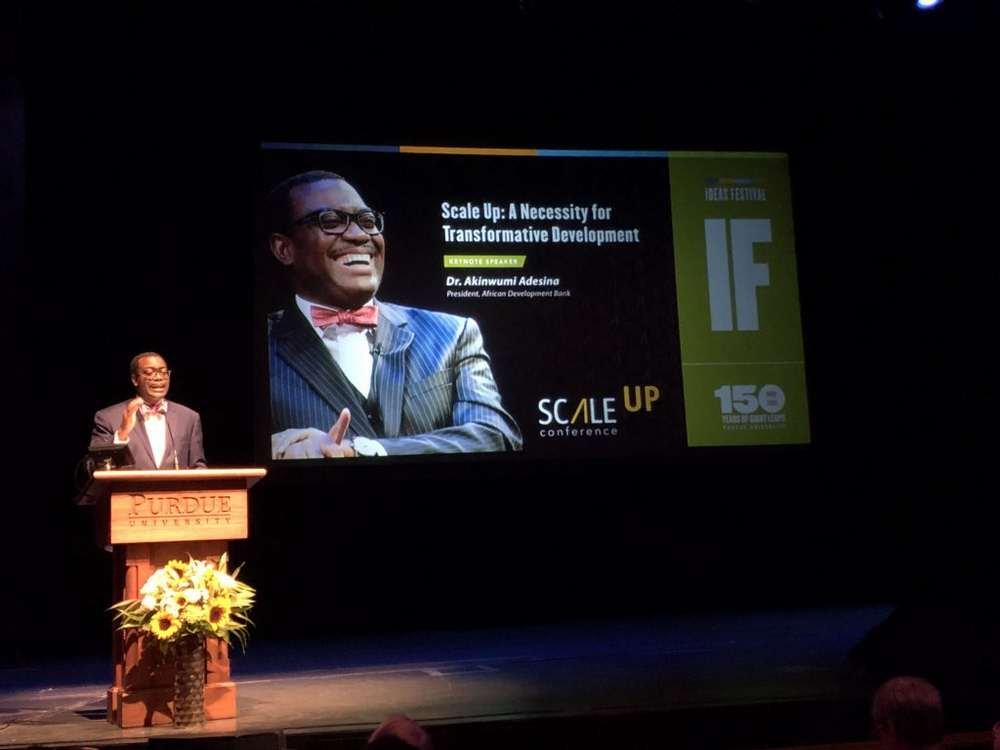African Development Bank seeks partnerships to lift 1 billion people out of hunger globally
Published by Gbaf News
Posted on September 26, 2018
5 min readLast updated: January 21, 2026

Published by Gbaf News
Posted on September 26, 2018
5 min readLast updated: January 21, 2026

African Development Bank seeks partnerships to lift 1 billion people out of hunger globally
“We must not get carried away: we are not winning the war against global hunger”
The African Development Bank called on global partners to join hands to lift one billion people worldwide out of hunger and said it was leading the way by investing US$24 billion in African agriculture over the next 10 years in the largest such effort ever.
“We are not winning the war against global hunger,” Bank President Akinwumi Adesina told an agriculture conference at Purdue University in Indianapolis on Tuesday, 25 September.
“We must not get carried away,” he added, referring to statistics showing a decline in the global population living on less than two dollars per day. In reality, the number of hungry people in the world had increased from 777 million in 2015 to 815 million in 2016, he said citing the latest World Food Security and Nutrition data.
Adesina told the audience that included researchers, implementing organizations, business leaders, policymakers and donors that simple technical and scientific methods were already making a whole difference to farm yields and income in Africa. While such technologies to deliver Africa’s green revolution exist, they are mostly just sitting on the shelves, he said.
“The release of water efficient maize varieties now allows farmers to harvest good yields in the face of moderate drought,” he noted. “Today, rice varieties exist that can give yields of 8 tonnes per ha. Cassava varieties exist with yields of up to 80 tonnes per ha. Heat tolerant and disease resistant livestock and technologies for ramping up aquaculture exist.”
Bank experts put current comparative yields at 1.5-2 tonnes per ha for rice and 10-15 tonnes per ha for cassava.
What was needed urgently was deployment of supportive policies to ensure technologies are cascaded down to millions of farmers. “All Africa needs to do is to harness the available technologies with the right policies and rapidly raise agricultural productivity and incomes for farmers and assure lower food prices for consumers.”
The Bank has launched its Technologies for African Agricultural Transformation (TAAT), a $1 billion initiative to extend the use of farm technologies. TAAT is currently engaging seed companies, public and private entities, and financial institutions in 27 countries to make technology available to a total of 40 million African farmers.
Combining targeted subsidies for farmers with a market-based system for rapidly expanding access to financing for farmers and agricultural value chains is the fastest way to get many people out of poverty to a sustained pathway for economic growth, Adesina added.
The conference on “ Scaling Up Agricultural Technologies for Transformation” (http://bit.ly/2NK3XL5) marked Adesina’s fond return to his alma mater.
“It was here, as a graduate student, that I began the journey of searching for ways to get technologies into the hands of millions of farmers,” he said. Adesina was to go on to make a huge impact on the transformation of agriculture in Africa, including implementing game-changing policies in his years as Nigeria’s Minister for Agriculture and Rural Development before taking up his post at the Bank in September 2015.
Adesina said the situation in Sub-Saharan Africa needed particularly urgent intervention due to the ravages of climate change. The International Food Policy Research Institute estimates that Africa will add 38 million to its number of hungry people by 2050 as a result of climate change. The Institute forecasts that Africa will experience major food shortages by 2020 and beyond, while malnutrition will be on the rise over the next 20 years.
The Bank’s ongoing initiatives had the objectives of growing income for farmers, stabilizing prices for staple crops, reducing losses and stimulating multiplier effects in local economies. With its Staple Crop Processing Zones and other initiatives, the Bank is demonstrating how this can be done.
“The African Development Bank put feeding Africa as one of its topmost priorities when it launched its Feed Africa strategy (http://bit.ly/2Q7A04c) in 2015 and is investing $ 24 billion in agriculture for Africa over 10 years – the largest ever such effort,” the Bank President said. Across Africa, the Feed Africa Strategy (http://bit.ly/2Q9GnUv) is supporting the development of policies, markets, infrastructure and institutions that will ensure that agricultural value chains are well developed and that technologies reach several millions of farmers.
Adesina called for global partnerships to establish Staple Crop Processing Zones across Africa.
“The SCPZs will provide several advantages for rural economies. They will create markets for farm produce. Raw materials will no longer be moved out of rural areas, but as finished value-added products. Post-harvest losses will be substantially reduced. Well integrated agricultural value chains will develop, with supportive logistics, especially warehousing and cold chains,” Adesina added.
The African Development Bank has already started investments to develop these SCPZs in a number of pioneering African countries, including Ethiopia, Togo, Democratic Republic of Congo and Mozambique. It expects the processing zones to be active in about 15 countries in the near-term.
Distributed by APO Group on behalf of African Development Bank Group (AfDB).
Explore more articles in the Top Stories category











